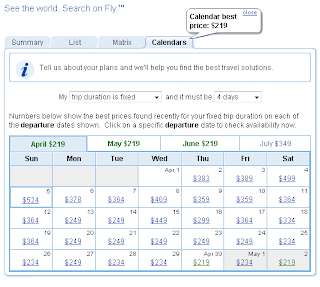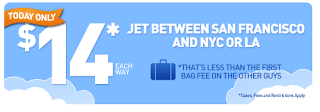Allegiant Air
pre-announced Q1 earnings of $1.34 to $1.38 per share this evening - beating analysts'
estimates of $1.18 per share. Good news in the airline industry? Yes, really. But
ALGT is no American, Delta or even
AirTran or
JetBlue. Why?
First, this is an airline built for leisure. Flying two or three days a week from
Podunk cities with limited other service (no offense, Sioux Falls, Duluth and
Bozeman) to key leisure destinations such as
Las Vegas, Orlando and the like attracts few, if any business travelers. Business travelers demand
frequency - two flights a week just won't cut it - especially when they are to cities with little business demand in the first place (now, no offense to Vegas, St
Pete and Orlando.) And where are the larger airlines hurting? Business travelers and international travelers - this is common knowledge. Guess how many of those kinds of travelers show up on ALGT? About zero.
Second, those leisure travelers buy a lot more than just air - they also buy hotel rooms. Lots of them. And guess who makes a margin on those hotel rooms. Yes,
Allegiant Air operates as a traditional travel wholesaler - a business the rest of the airline industry got out of years ago. But, if you haven't noticed, the hotel industry is hurting these days - and guess who they are offering great package rates to? Yes,
ALGT.
Third,
ALGT is really, really cheap. They don't operate complicated hubs. They only fly relatively old (and cheap to
acquire) MD-80s. They do the majority of their bookings by far on their own website. And they market in tiny cities - what do you think the cost of marketing is to customers in Springfield, Missouri vs. Chicago? Most of their flights are simple "out and backs" from their key focus cities - they leave in the morning, fly somewhere and return back. No need for crew hotel rooms. Best of all, many of these small cities are so
desperate for air service (even if it is to Orlando) they are even willing to contribute marketing funds to
ALGT to market their services. Not a bad place to be.
Finally,
ALGT is relatively insulated from competition. The major airlines want nothing to do with Vegas right now, much less from Fargo. Several years ago, Northwest got cranky when
ALGT began cranking up operations in Fargo, Bismark and other small towns that Northwest has traditionally protected as their turf (code for kept service levels reasonably high but fares off the charts.) Northwest added flights from Sioux Falls, Fargo etc into Vegas but they rapidly proved to be failures. Northwest's costs were too high and they didn't have the packages (read: hotel rooms) that
ALGT continues to drive significant margin from.
Of late, some carriers seem to have taken note of
Allegiant's success and added competitive service. Alaska Airlines woke up and realized that
ALGT was moving significant passengers from tiny
Bellingham (~88 miles from hometown Seattle) to Vegas and
added three flights per week in direct competition with
ALGT.
Airtran also seems to be concerned (or has decided
imitation is easier than innovation) and has added a bunch of 3 and 4 times weekly service from Orlando to such as Charleston WV, Allentown, Knoxville and
Ashville. But these routes have little chance of success. First, neither
Airtran nor
Alasaka Air have the hotel inventory required to make these routes work in the same way that
ALGT does. They also have fundamentally higher costs than
ALGT. Finally, who cares? If Allentown gets more service than it can handle (pushing down yields as a result) between
Airtran and
Allegiant,
Allegiant can simply pull up stakes and move the aircraft elsewhere. And, history has shown that, with competition negated, Airtran (or Delta or Northwest) will rapidly depart the market as well. Pity Allentown.
 There does not seem to have been any fanfare associated with this launch - nary even a press release but then again, Travelocity may have been a little occupied with the ongoing booking fee battles to focus on this product launch.
There does not seem to have been any fanfare associated with this launch - nary even a press release but then again, Travelocity may have been a little occupied with the ongoing booking fee battles to focus on this product launch. Not unlike Hotwire, star ratings, amenities and a fixed (rather than name-your-own as at Priceline) price is shown. Traveler reviews are masked as well as any other descriptive data that would enable a potential customer to identify the hotel.
Not unlike Hotwire, star ratings, amenities and a fixed (rather than name-your-own as at Priceline) price is shown. Traveler reviews are masked as well as any other descriptive data that would enable a potential customer to identify the hotel.













